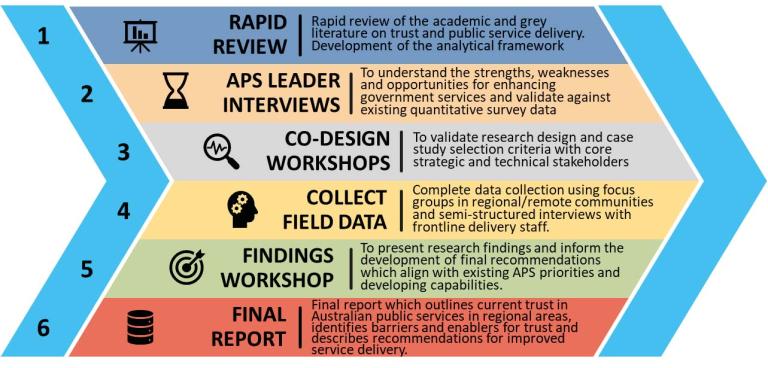Introduction
Research context – the burning platform of distrust
The evidence from international and sectoral studies of service delivery is that public sector leaders around the world are facing a common set of challenges to meet the increased expectations of their ‘customers’, ‘clients’, or ‘citizens’ in an era of declining public trust[3]; however, while the challenges may be consistent, the ways in which they are being confronted, and the results that are being achieved, vary considerably.
A common challenge faced by every organisation (public and private), and particularly the Australian public service (APS), is how to better service its clients, citizens and businesses, and at a sustainable price. To address this, the APS needs to find ways to improve the efficiency and effectiveness of its service delivery functions.
This challenge is particularly acute in regional and rural Australia where, as identified by the Citizen Experience Survey, citizens have a lower level of trust in Australian public services compared to their urban counterparts. In regional and remote Australia effective and efficient service delivery is potentially compromised by a combination of the ‘tyranny of distance’, the absence of critical population mass, idiosyncratic demography, sporadic smart phone and internet access, and the difficulty of attracting and maintaining core capabilities.
This reduced trust in Australian public services is prompting the APS to explore new, sustainable models for regional service delivery: models that can improve user experience and outcomes through enhanced service levels at the same or reduced cost. The first stage in this process of discovery is to give voice to the diverse views of users, to make sense of their journeys through the service system, and, to use their insights to improve the citizen experience. The Regional trust in Australian public services project gives voice to these insights.
The purpose of this report
The primary objective of this research is to provide the Department of Prime Minister and Cabinet with a better understanding of public demand for, and trust in, Australian public services in regional/rural/remote areas, with the aim of guiding the delivery of responsive public services that meet the needs of users in these areas. The report builds on existing quantitative research conducted by the Department on citizens’ perceptions of government services, the Citizen Experience Survey. The research is also designed to: enhance other data collections and reporting of the Department; enable the Department to guide cross-agency collaboration on Australian public service reform; and, provide research insights that can be used by other APS agencies to improve specific service delivery design and reform.
With these objectives in mind the report focuses on four key research questions:
- What characteristics of public service delivery approaches (i.e. design) are supporting or inhibiting trust in Australian public services in regional areas, and how do regional citizens want to receive public services?
- Is the regional trust deficit affecting the uptake of Australian public services in regional areas?
- Are there particular barriers (e.g. service communication constraints) affecting the uptake of Australian public services in regional areas?
- How can the Australian Public Service (APS) improve trust in public services in regional Australia?
Many of the underlying drivers of trust and areas for potential improvement stem from, and/or are exacerbated by, current service systems and culture. The report therefore proposes alternate future-state options drawing on international better practice and stakeholder insights. In addition, the report includes recommendations for future research and best practice-methods for engagement with these specific communities.
Research design
A modified participatory action research design was selected for this project ensuring that innovative qualitative research and sampling methods were deployed combined with the latest applied insights from key public service actors (see Figure 1). A mixed methods approach to data collection was co-designed with core stakeholders and included:
- a review of national and international practice-based literature on public trust and achieving ‘line of sight’ in the delivery of ‘customer’ oriented service systems;
- documentary analysis of recent reviews of existing APS practice to provide an assessment of the quality of current service systems;
- workshops with a) strategic policy actors and b) data experts to inform the project design and delivery;
- a series of ‘one to one’ interviews with senior public servants with a strategic role in the area on the barriers and enablers to improved public service production; and with frontline service delivery staff[4]
- a representative sample of 34 focus groups conducted across regional and rural Australia; and two comparative focus groups in an urban community; and,
- a co-design workshop convened with core stakeholders to translate the research findings in a meaningful way for practice.

The structure of the report
The report is organised into five substantive sections and a conclusion. Following this introduction, Section Two reviews the existing academic and grey literatures of trust in regional service delivery. The lessons from this review inform the presentation of the analytical framework and research methodology in Section Three. In Sections Four and Five, we present the key findings from the focus group and elite interview components of the project. The concluding section highlights six focus areas of improvement for the Department and maps the constituent elements of a change management strategy as a plausible way forward to building trust systems between government and citizen, through reform of Australian public service delivery.
Footnotes
[3] It is noteworthy that the APS does not have a common language in this regard.
[4] Access to frontline service delivery staff was difficult with staff not given permission to participate in the research. This results in a gap in our understanding of their experiences and insights which warrants further research where such permission is granted from the outset.



